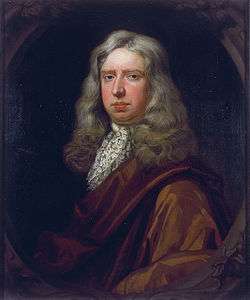William Hewer

William 'Will' Hewer (1642 – 3 December 1715) was one of Samuel Pepys' manservants, and later Pepys's clerk, before embarking on an administrative career of his own. Hewer is mentioned several times in Pepys' diary and was ultimately the executor of Pepys' will.
Pepys' manservant
Hewer was employed by Samuel Pepys as a manservant and office clerk for Pepys' work as the new Clerk of the Acts to the Navy Board.[1] By November 1663, Hewer was able to move out of Pepys' house and have his own lodgings.
Hewer was initially introduced to Pepys by Hewer's uncle Robert Blackborne, whose sister was Hewer's mother, and who was a longtime Pepys friend with whom he worked at the Admiralty. It has been said that the biggest favor Blackborne did for Pepys was the introduction of his nephew Hewer to Pepys in 1660.[2]
Hewer in Pepys' diary
Hewer is frequently mentioned in Pepys' diary as a trusted friend as well as an assistant. As their relationship developed, it became a professional partnership as well as a personal friendship. When Pepys moved to the Admiralty in 1673, Hewer moved to the Admiralty as well and became Chief Clerk the following year. In 1677, he was appointed as Judge Advocate-General.
Hewer late career
In 1685, he became MP for Yarmouth, Isle of Wight. He was appointed to the Special Commission which replaced the Navy Board in 1686 with responsibility for accounts. After the deposition of James II in 1689, Pepys and Hewer lost their patronage from the Crown; both were briefly imprisoned, but were released without trial.
Hewer managed to become very rich.[3] He made much of it through his involvement in trading with his uncle Blackborne, who became Secretary to the Admiralty, and later Secretary to the British East India Company.[4]
Like Pepys, Hewer also received payments from those doing business with the Navy, but suspicions of illicit payments were never proved and he did not hold a lucrative office for any length of time. He probably also inherited from his father, who was a merchant, as Pepys' diary mentions his increased expenditures after his father's death in 1665. By 1674, Hewer was wealthy enough to finance the construction of three warships. He became a director of the old East India Company in 1698 and served two terms as its Deputy Chairman. He also served as Treasurer of Tangier.
He owned a house near The Strand which became the Admiralty Office when he and Pepys moved from the Navy Board. Pepys also lived in the house while he was at the Admiralty.
He bought an estate in the then-village of Clapham in 1688 which he used as a country retreat.[5] (Hewer also owned other property in Clapham, London, Westminster, Norfolk and elsewhere.) Pepys went to live in Hewer’s house on Clapham Common in his old age and died there in 1703. Hewer was the executor of Pepys' will and retained Pepys' library and book collection including his famous diary until he died on 3 December 1715. Wiliam Hewer is buried in St. Paul's Church, Clapham.[6]
Hewer never married and so devised that his estate go to his godson Hewer Edgeley on the condition that he change his surname to Hewer. This the heir did, becoming Hewer Edgeley-Hewer. [7] Subsequently lawsuits arose over the immense Hewer estate.[8][9] In 1684 William Hewer was admitted to the Freedom of the Clothworkers' Company, and was immediately sworn in as a member of the Court of Assistants. He was elected Master of the Clothworkers' Company for the 1686-87 year. In 1687 he donated a barge to the Clothworkers' Company. It seems that he did not attend a single Court meeting during his Mastership. [10]
References
- ↑ The Diary of Samuel Pepys Companion, ed. Latham, Robert & Mathews, William, HarperCollins 2000 ISBN 0-520-22715-8, page 182
- ↑ The Diary of Samuel Pepys, Vol. 10, Samuel Pepys, Robert Latham, William Matthews (eds.), University of California Press, 2001
- ↑ The Diary of Samuel Pepys Companion, ed. Latham, Robert & Mathews, William, HarperCollins 2000 ISBN 0-520-22715-8, page 183
- ↑ The Diary of Samuel Pepys, Vol. 10, Samuel Pepys, Robert Latham, William Matthews (eds.), University of California Press, 2001
- ↑ Old Clapham, John William Grover, London, 1892
- ↑ Pepys, Samuel (1899). The Diary of Samuel Pepys, Volume 9. London: George Bell and Sons.
- ↑ Thoroton versus Blackborne et al., The English Reports, William Green & Sons, Edinburgh, 1903
- ↑ Blackborn versus Hewer Edgeley, Reports of Cases Argued and Determined in the High Court of Chancery, his Majesty's law printers for E. Brooke, London, 1787
- ↑ The House of Lords Cases on Appeal and Writs of Error, Vol. III, Charles Clark, Little, Brown & Co., Boston, 1870
- ↑ The Deluge of Time - An Illustrated History Of The Clothworkers' Company, DE Wickham, 2001, pages 130, 200, 201, 131.
| Parliament of England | ||
|---|---|---|
| Preceded by Sir Thomas Littleton Lemuel Kingdon |
Member of Parliament for Yarmouth 1685–1689 With: Thomas Wyndham |
Succeeded by Sir Robert Holmes Hon. Fitton Gerard |